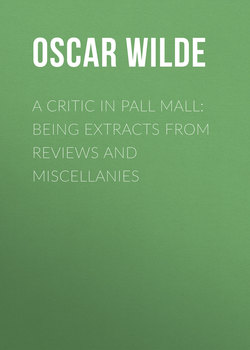Читать книгу A Critic in Pall Mall: Being Extracts from Reviews and Miscellanies - Оскар Уайльд, Wilde Oscar, F. H. Cornish - Страница 13
BEN JONSON
Оглавление(Pall Mall Gazette, September 20, 1886.)
As for Mr. Symonds’ estimate of Jonson’s genius, it is in many points quite excellent. He ranks him with the giants rather than with the gods, with those who compel our admiration by their untiring energy and huge strength of intellectual muscle, not with those ‘who share the divine gifts of creative imagination and inevitable instinct.’ Here he is right. Pelion more than Parnassus was Jonson’s home. His art has too much effort about it, too much definite intention. His style lacks the charm of chance. Mr. Symonds is right also in the stress he lays on the extraordinary combination in Jonson’s work of the most concentrated realism with encyclopædic erudition. In Jonson’s comedies London slang and learned scholarship go hand in hand. Literature was as living a thing to him as life itself. He used his classical lore not merely to give form to his verse, but to give flesh and blood to the persons of his plays. He could build up a breathing creature out of quotations. He made the poets of Greece and Rome terribly modern, and introduced them to the oddest company. His very culture is an element in his coarseness. There are moments when one is tempted to liken him to a beast that has fed off books.
We cannot, however, agree with Mr. Symonds when he says that Jonson ‘rarely touched more than the outside of character,’ that his men and women are ‘the incarnations of abstract properties rather than living human beings,’ that they are in fact mere ‘masqueraders and mechanical puppets.’ Eloquence is a beautiful thing but rhetoric ruins many a critic, and Mr. Symonds is essentially rhetorical. When, for instance, he tells us that ‘Jonson made masks,’ while ‘Dekker and Heywood created souls,’ we feel that he is asking us to accept a crude judgment for the sake of a smart antithesis. It is, of course, true that we do not find in Jonson the same growth of character that we find in Shakespeare, and we may admit that most of the characters in Jonson’s plays are, so to speak, ready-made. But a ready-made character is not necessarily either mechanical or wooden, two epithets Mr. Symonds uses constantly in his criticism.
We cannot tell, and Shakespeare himself does not tell us, why Iago is evil, why Regan and Goneril have hard hearts, or why Sir Andrew Aguecheek is a fool. It is sufficient that they are what they are, and that nature gives warrant for their existence. If a character in a play is lifelike, if we recognize it as true to nature, we have no right to insist on the author explaining its genesis to us. We must accept it as it is: and in the hands of a good dramatist mere presentation can take the place of analysis, and indeed is often a more dramatic method, because a more direct one. And Jonson’s characters are true to nature. They are in no sense abstractions; they are types. Captain Bobadil and Captain Tucca, Sir John Daw and Sir Amorous La Foole, Volpone and Mosca, Subtle and Sir Epicure Mammon, Mrs. Purecraft and the Rabbi Busy are all creatures of flesh and blood, none the less lifelike because they are labelled. In this point Mr. Symonds seems to us unjust towards Jonson.
We think, also, that a special chapter might have been devoted to Jonson as a literary critic. The creative activity of the English Renaissance is so great that its achievements in the sphere of criticism are often overlooked by the student. Then, for the first time, was language treated as an art. The laws of expression and composition were investigated and formularized. The importance of words was recognized. Romanticism, Realism and Classicism fought their first battles. The dramatists are full of literary and art criticisms, and amused the public with slashing articles on one another in the form of plays.
‘English Worthies.’ Edited by Andrew Lang. Ben Jonson. By John Addington Symonds. (Longmans, Green and Co.)
